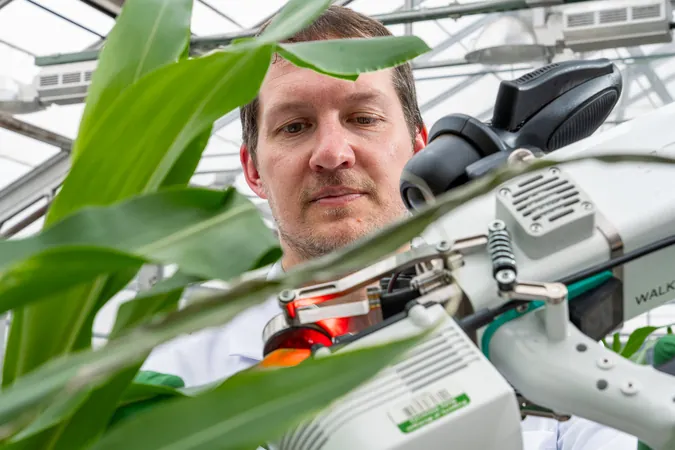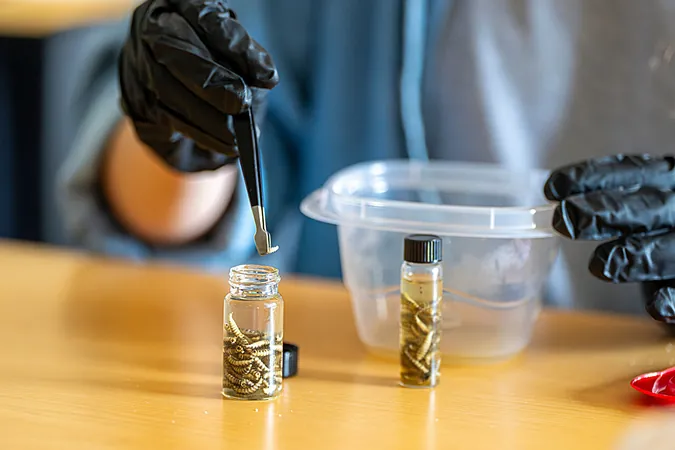
Climate Change Threatens Future of Key Prenatal Vitamin: Shocking Plant Findings Reveal Risks Ahead
2025-09-03
Author: Wei
Groundbreaking Discovery on Photorespiration and Nutrition
A groundbreaking study from Michigan State University has uncovered the surprising role of photorespiration—a process long deemed wasteful—in producing a vital nutrient that helps prevent birth defects. This may change how we view plant processes and their implications for human health.
The Unexpected Role of Photorespiration in Folate Production
Researchers, led by MSU's Berkley Walker, discovered that roughly 6% of the carbon absorbed by plants is channeled into creating folates, a vital class of nutrients including vitamin B9, essential for prenatal health. Alarmingly, that percentage drastically falls by five times if photorespiration is inhibited.
Climate Change Could Diminish Plant Nutrition
Published in the prestigious journal Nature Plants, these findings indicate a worrying trend: as climate change raises carbon dioxide levels, the effectiveness of photorespiration lessens, potentially leading to a significant decline in the nutritional value of staple crops, particularly rice. Walker emphasizes, "It's critical to address the nutritional quality of rice in cultures that depend heavily on it."
Understanding the Plant Factory: The Role of Rubisco
Plants operate like intricate factories utilizing sunlight, water, and carbon dioxide to create sugars for energy. The enzyme rubisco plays a pivotal role, efficiently capturing CO2 for production. However, when rubisco mistakenly bonds with oxygen instead, it interrupts the process, generating a toxic byproduct called phosphoglycolate. Photorespiration is the plant's mechanism to recover from this setback.
How Scientists Measured the Impact of Photorespiration
Walker’s team employed the model plant Arabidopsis thaliana to quantify how much carbon is funneled into folate production during photorespiration. Using advanced techniques such as infrared gas analysis and mass spectrometry, they meticulously tracked carbon movement under various conditions.
The Race Against Time: Future Nutritional Challenges
The data paints a stark picture: as atmospheric CO2 levels rise, the carbon flow necessary for vitamin B9 production plummets from 6% to a mere 1%. This is especially concerning for pregnant women, as vitamin B9 is crucial for minimizing the risk of neural tube defects.
Engineering Plants for a Healthier Future
Walker warns, “Understanding how nature produces this vitamin is crucial for engineering plants that are fortified with this nutrient.” This knowledge could be vital for communities that rely on nutrient-rich crops but lack access to supplements.
Next Steps: Real-World Applications
The Walker lab aims to extend their research to outdoor crop plants, seeking to confirm whether the trends observed in the lab hold true in natural settings. Walker emphasizes the importance of this foundational knowledge for future plant engineering.
As the world faces mounting challenges from climate change, understanding plant biology becomes increasingly urgent. If we don't grasp the fundamentals, we may find ourselves unprepared for the obstacles ahead.


 Brasil (PT)
Brasil (PT)
 Canada (EN)
Canada (EN)
 Chile (ES)
Chile (ES)
 Česko (CS)
Česko (CS)
 대한민국 (KO)
대한민국 (KO)
 España (ES)
España (ES)
 France (FR)
France (FR)
 Hong Kong (EN)
Hong Kong (EN)
 Italia (IT)
Italia (IT)
 日本 (JA)
日本 (JA)
 Magyarország (HU)
Magyarország (HU)
 Norge (NO)
Norge (NO)
 Polska (PL)
Polska (PL)
 Schweiz (DE)
Schweiz (DE)
 Singapore (EN)
Singapore (EN)
 Sverige (SV)
Sverige (SV)
 Suomi (FI)
Suomi (FI)
 Türkiye (TR)
Türkiye (TR)
 الإمارات العربية المتحدة (AR)
الإمارات العربية المتحدة (AR)